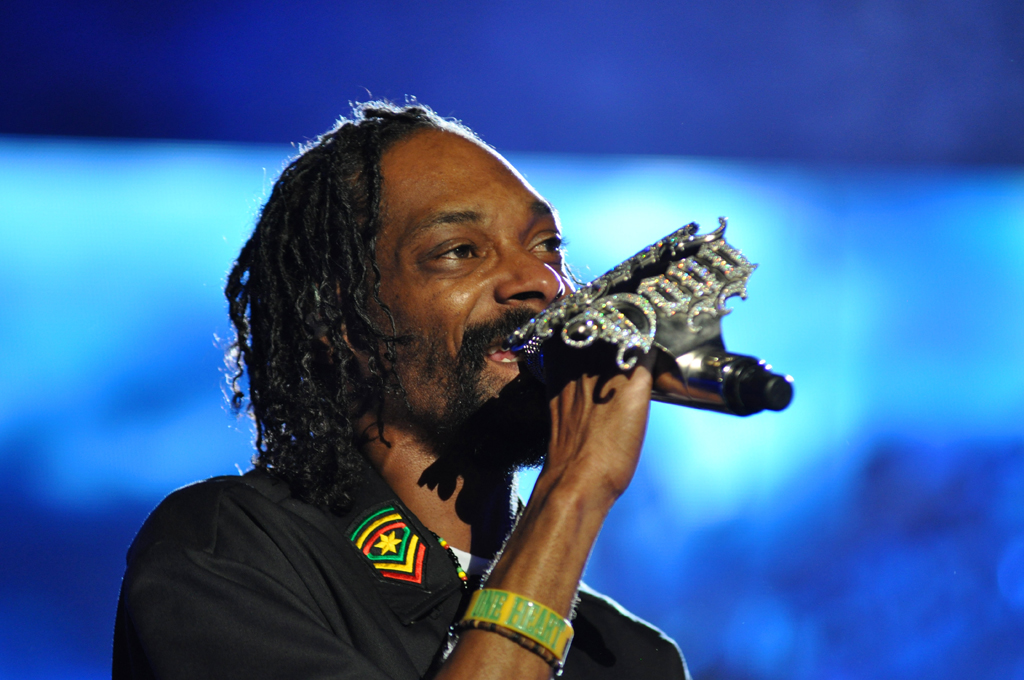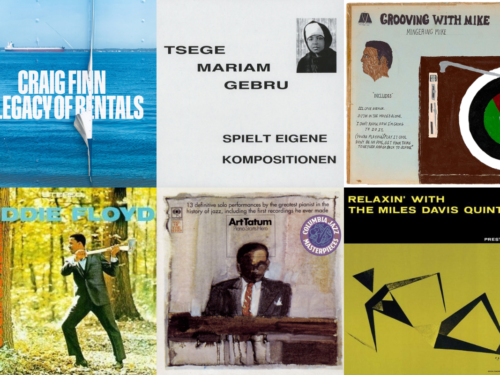The third decade of Snoop’s career finds him reinventing himself as one of the most capricious and experimental of all elder pop statesmen.
Have you ever seen a poster of Snoop Dogg? The Doggfather is at least as beloved among dorm-room stoners as Bob Marley, and he’s arguably even more photogenic, with his lithe, feline features and eyes perpetually narrowed in an arrogant assertion of his own badassery. But it’s Marley’s smiling face that adorns tapestries on walls the world over. That’s because Snoop doesn’t need to be on a poster. He’s in the air. He’s the god of stoner aspiration: effortlessly cool, rich, known the world over, still allegedly blazing through 81 blunts a day with a retinue of literal weed carriers never far away. To have a poster of Snoop Dogg in a stoner den would be overkill, because wherever blunts are being sparked, wherever weedheads are living their best lives, he’s there in the smoke.
A lot of rappers are something other than rappers in the cultural eye. Dr. Dre’s the consummate businessman; you’d be forgiven for not even knowing he dropped his long-awaited third album in 2015 as a tie-in with Straight Outta Compton. Jay-Z is an auteur who can conjure up music of great significance when he wants to, but he’s more comfortable with and probably better-known for cash-grabs like The Blueprint 3 or Magna Carta Holy Grail. Snoop Dogg might be the only living rapper who’s respected more for transcending his status as an artist, and even his more embarrassing ventures — like the facetious Rastafari documentary Reincarnated — aren’t greeted with cynicism but affection (at least by non-Rastafari; Rastas have every right to be pissed).
Read about Portland’s dream-punk band Glacier Veins here
Snoop’s taken full advantage of this. Still prolific, he’s deep in one of the weirdest career tangents of any pop elder statesman this side of Neil Young. Of his last six albums, only two have been proper rap albums, and both of those, Coolaid and Neva Left, were exceedingly odd. More representative are the two electro-funk albums he’s made, 7 Days of Funk with Dām-Funk and Bush with Pharrell Williams; his reggae album Reincarnated; and, just this year, the sprawling two-hour-plus gospel compendium Bible of Love. None of these albums are masterpieces, but they’re solid, even the gospel one, and it’s safe to say no one can predict what the Doggfather will do next. He could do a psych-folk album with Van Dyke Parks strings next, for all we know, and it’d probably be worth a listen.
When Snoop Dogg changed his name to Snoop Lion in 2012, allegedly permanently, fans guffawed. Would we have to call him that for the rest of our lives? Luckily for us we didn’t, and Bible of Love confirms Snoop’s interest in Rastafari didn’t extend far beyond smoking a lot of weed. But in a way, we’ve been reckoning with Snoop Lion since. Reincarnated began an enviably frivolous period for the now-46-year-old rapper. While a lot of revered rappers stay true to their style to diminishing returns (Ice Cube) or experiment to distract from their flagging skills on the mic (Ghostface, MF Doom), Snoop is living the dream for any middle-aged artist: he’s earned the right to make whatever the fuck he wants, while still possessing the artistic acumen to pull it off.
He’s even grown as an artist. He doesn’t say appalling things anywhere near as often as he did during his commercial peak, and though Neva Left devotes long stretches of its runtime to emasculating rival rappers in gendered language — and whose “Moment I Feared” video featured a homophobic diss against Young Thug, which Thugger himself was almost certainly in on — we’re a long way from his enthusiastic defense of domestic violence on 2004’s “Can You Control Ya Hoe.” He’s mostly benevolent now, and though he’s still capable of chilling threats, his best songs play into his modern-day role as a jester — like “Cars,” which thrives on the dissonance between its rapturous love of luxury vehicles and its source material in Gary Numan’s paranoid synth-pop hit “Cars.”
He also knows when not to let his ego get the best of him, something that couldn’t be as easily said of equally genre-frivolous artists like Sting or Elvis Costello. On both Reincarnated and The Bible of Love he cedes much of his airtime to his guests, perhaps knowing Snoop singing dancehall or gospel isn’t something we’d necessarily want to hear for a whole album. Of all his recent albums, he sounds most comfortable on 7 Days of Funk, which takes his George Clinton worship to the extreme. Having likely memorized every P-Funk record, he slips effortlessly into the cosmic radio announcer role Clinton adopted on songs like “Loopzilla” or “P-Funk (Wants To Get Funked Up).”
Most artists who are still capricious this deep into pop canonization are no-fucks icons who fans expect to march to their own beat — David Byrne, David Bowie, Nick Cave, Kate Bush. Snoop isn’t really like this. In fact, it’s hard to find a parallel in rap except perhaps E-40, who’s nowhere near the household name Snoop is. What’s so gobstopping about Snoop’s late career is that he’s not fulfilling any kind of expectation. He could make Doggstyle clones until he dies, or he could edge his music ahead of his persona in the public consciousness with pandering hits or strain-and-moan attempts at masterpieces. But there’s one constant in Snoop’s recent work: he’s doing whatever the fuck he wants.
Image courtesy of Jason Persse on Flickr.
(Split Tooth may earn a commission from purchases made through affiliate links on our site.)




